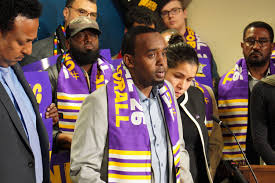Minnesota rideshare drivers, who are classified as independent contractors, are seeking a path to unionize after a law passed last year did not deliver the pay gains they expected.
BY: Alfonzo Galvan
Less than a year after Minnesota legislators passed a law setting a statewide pay floor for rideshare drivers, a group of drivers is back at the Capitol seeking a path to unionizing.
Drivers at a Tuesday news conference said the expected pay gains did not materialize, and they’re hoping a new bill will give them the leverage to negotiate directly with rideshare companies and offer more transparency over benefits.
Sen. Zaynab Mohamed, DFL-Minneapolis, and Rep. Samakab Hussein, DFL-St. Paul, are drafting the bill with support from Service Employees International Union Local 26.
“Drivers are already putting in the work every day, and it is time that they have a voice and power in the industry they sustain,” Zaynab said at Tuesday’s news conference
“The drivers feel like they’re being fooled, and this is why we’re being very careful about any other legislation that comes forward,” said Farhan Badel, a rideshare driver who’s been advocating for policy change for the last two years.
Key players behind last year’s pay floor law, including the Minnesota Uber/Lyft Drivers Association (MULDA), are not involved in the current effort.
Samakab said the bill would follow a model created in Massachusetts, which in November became the first state to allow rideshare drivers to unionize through a ballot initiative.
The bill would update Minnesota law to allow rideshare drivers to bargain for better wages after signing a petition to unionize. Drivers would then vote to approve a common contract with the rideshare companies, Zaynab said.
A difference between the Massachusetts model and the plans for Minnesota is drivers would gain the right to unionize through a state law, instead of a ballot measure.
Under the proposal, if a union organizes at least 10% of eligible drivers, rideshare companies would have to give them a list of all drivers in Minnesota, with contact information.
The proposal also states that all rideshare companies in the state would be required to bargain with a certified union representative at one table.
The parties would bargain over compensation, benefits, and conditions of work, according to the proposal. Any agreement reached by the parties would also need to be approved by a vote of all drivers who completed at least 100 rides in the previous quarter.
Tuesday’s announcement came months after a new law went into effect establishing a minimum pay rate for drivers statewide.
Under the law, drivers are now guaranteed a minimum pay of $1.28 a mile and 31 cents per minute while transporting a rider. The pay floor is calculated based on rides delivered over a two-week period, which some drivers say means they make less overall for some rides than they did in the past.
Farhan said he and other drivers feel like they’re “back at square one” when it comes to a pay rate, so they’d support the right to unionize so long as they can maintain their status as independent contractors.
“That’s why they [drivers] love driving. It’s because it gives them that flexibility. You have full-time students who can come in, clock in, you have people who do this for a living, they can take their kids to the doctors, they can drop off their kids at school and not have to request time off, they can go to Africa,” Farhan said. “So this is very crucial, and this is why we said we’ve been fooled once. We don’t want to be fooled twice.”
Said Mohamed, another driver present at Tuesday’s news conference, said the new bill could give drivers more leverage when dealing with rideshare giants Uber and Lyft.
“Nobody lives on $1.38 cents [an hour], I don’t think you pay your bills on that,” Said said.
According to him, the biggest issue with the current pay rate is how it’s paid out.
“Our bills cannot wait 19 days for them to come out with the calculations, if our bills cannot wait we need to be paid on time like everybody else,” he said.
Uber spokeswoman Freddi Goldstein said last year’s law was developed in collaboration between drivers, rideshare companies and legislators to address priorities set by the drivers.
“It is not constructive to have late-to-the-game parties show up to risk what’s been achieved to advance their own interests,” she said in a statement.
A key difference in previous rideshare driver visits to the state Legislature is who is helping organize them, this time around Service Employees International Union Local 26 is a leading voice in discussions.
“This year we’re even bigger, we’re forming a union. A union is much, much stronger than the previous organization we were with,” Said said. MULDA President Eid Ali, a key player in last year’s bill, did not return calls seeking comment.
Zaynab said last year’s bill gave drivers “a lot more than what they had” but the new bill she’s drafting would allow drivers to negotiate directly with the rideshare companies and avoid future trips to the Legislature.
“It doesn’t take anything away that we did, those policies did pass, we all stand behind it, they’re very good for our drivers,” Zaynab said.
The bill, once introduced, will face steeper odds than last year’s driver pay bill. The DFL no longer has a trifecta, and any legislation would need at least one Republican vote to pass in the House.

